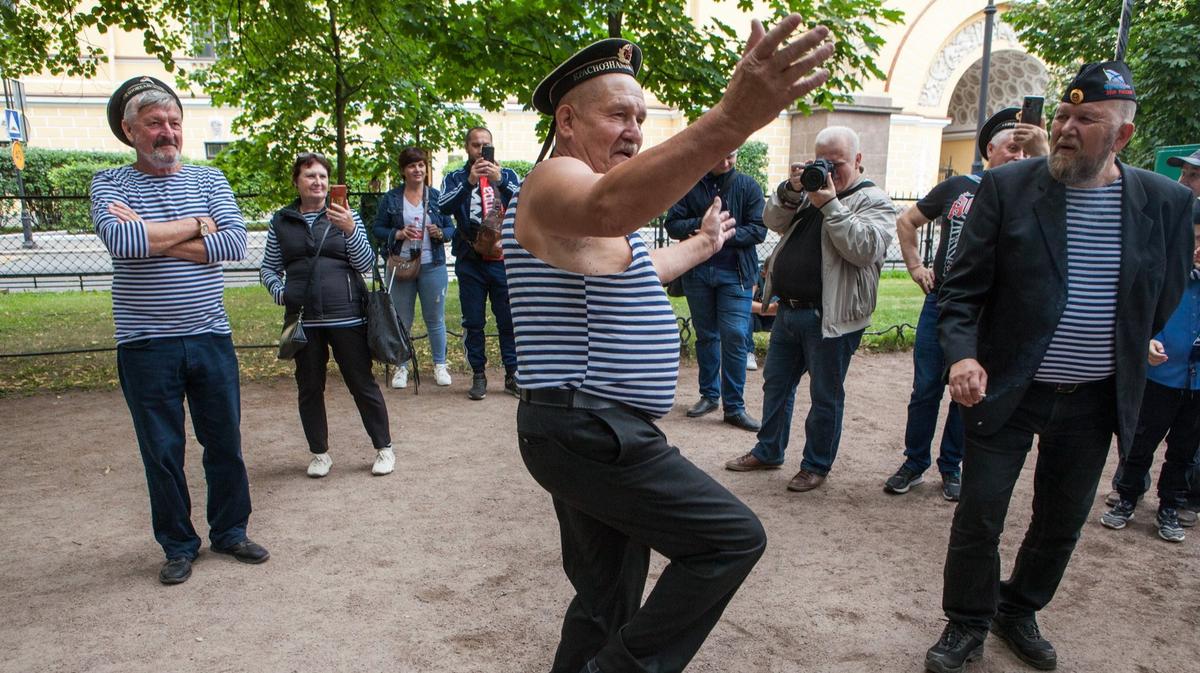Two days before Russia’s Navy Day, celebrated on 31 July, Vladimir Putin signed a presidential order on holding a Navy parade in St. Petersburg. On the eve of the celebrations, Zvezda TV channel, run by the Russian Defence Ministry, showed a video clip with a military orchestra performing a “hymn of the special military operation”. This meant that this year’s parade would be a special one. We also found out that the “special operation” apparently has a hymn now: a potpourri of two songs by Sektor Gaza, a Russian punk rock band that achieved cult status in the nineties. Someone deemed these punk rock anthems a good fit for the “special operation”.
Thousands of people came out to see the parade of Russian military warships. It is hard to say how many people attended the festivities exactly, because not everyone was able to see the ships. The parade started at 11 in the morning. A couple of hours earlier, people started gathering along St. Petersburg’s embankments to get the best spots. Then the crowd grew, filling the neighbouring streets. Many of the attendees could only see the aviation part of the parade.
“As always, you can’t get anywhere, everywhere’s closed,” Vera, a resident of St. Petersburg who attended the festivities with her grandson Mark, tells us. “We managed to get through somehow. We saw a part of it. But there wasn’t much to see, we wanted to see more ships. We liked the planes, though. But there weren’t a lot of ships. And everything was cordoned off, you couldn’t get anywhere. We knew there would be many people, but we didn’t think the embankments would be cordoned off and they would only let in people with passes. Turns out that it’s not for the people, only for the chosen ones with the passes. My grandson had to get on a trashcan to see the parade.”
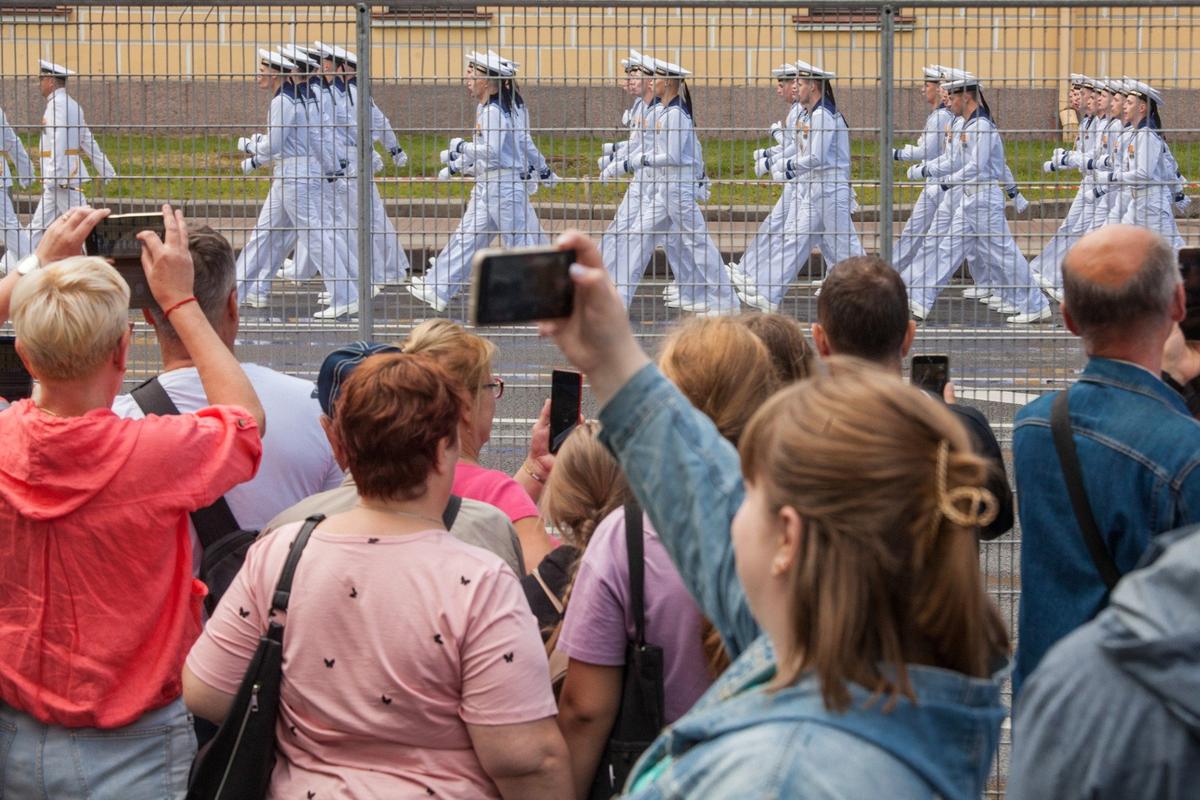
Columns of sailors march across the Palace Passage. Photo: Elena Rodina for Novaya Gazeta. Europe
They really wanted to see the parade. They even bought a flag for Mark!
“I mean, it’s the Na-a-vy,” Vera stretches out her words. “It’s our power! Our army!”
Sergey, another attendee of the festivities, is more experienced with these things. He set up camp on the embankment at half past seven, three-and-a-half hours before the parade began. He was already on his way back at 12 in the afternoon. While I interviewed him, he was attaching the St. Andrew's flag, the ensign of the Russian Navy, to his car.
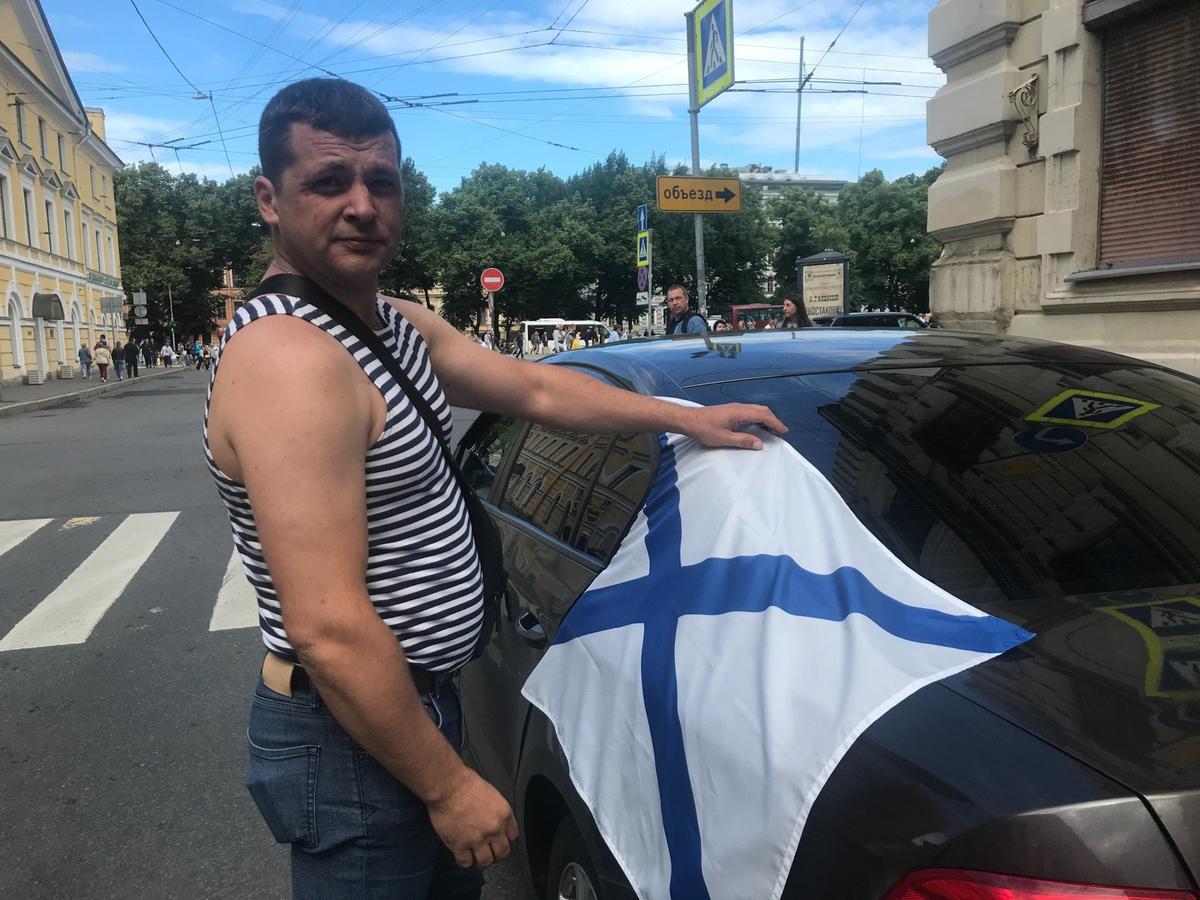
Sergey. Photo: Irina Tymakova for “Novaya Gazeta. Europe”
“We waited to get the best spot to see the ships,” he explains. “It’s my holiday, I’m an army guy.”
Sergey is even glad that this year, the parade is held at the same time as the “special military operation”.
“What do we have to be afraid of?” he chuckles. “We are celebrating. Because we are proud.”
“Proud of what?” I ask him.
“Of this,” he points to the flag that he attached to the back door of his car to make it flutter in the wind while he is driving.
“What else are you proud of?”
“My country. Everything.”
“Is your pride affected in any way by what happened to the Moskva cruiser?”
“And what happened? There’s nothing to it.”
Alexey, who is also on his way back from the parade, is wearing a black military uniform with a Bowl of Hygieia sign: he is a military medic. He asks me not to take any photos of him.
“I am a patriot of my country,” he says, explaining why he and his wife came to see the parade. “In any case, I… let’s say I understand my motherland. I always support it.”
As a military medic, Alexey has seen injured soldiers returning from the special military operation. He does not want to answer my question on whether Russia should continue its operation in Ukraine when soldiers are getting injured and killed.
“I’m not going to respond to political questions,” he says. “I understand that the special operation is necessary. Whether we should or shouldn’t continue is not for me to say. This country raised me, it gave me an education, it gave me my life. It’s my home.”
A man dressed in a white-and-blue sweater with an anchor print and ARMANI written on its chest pocket does not want to state his name, but he is ready to take pictures. He takes off his sweater to take a picture in his striped Navy tank top. He puts a Black Sea Fleet cap on his head.
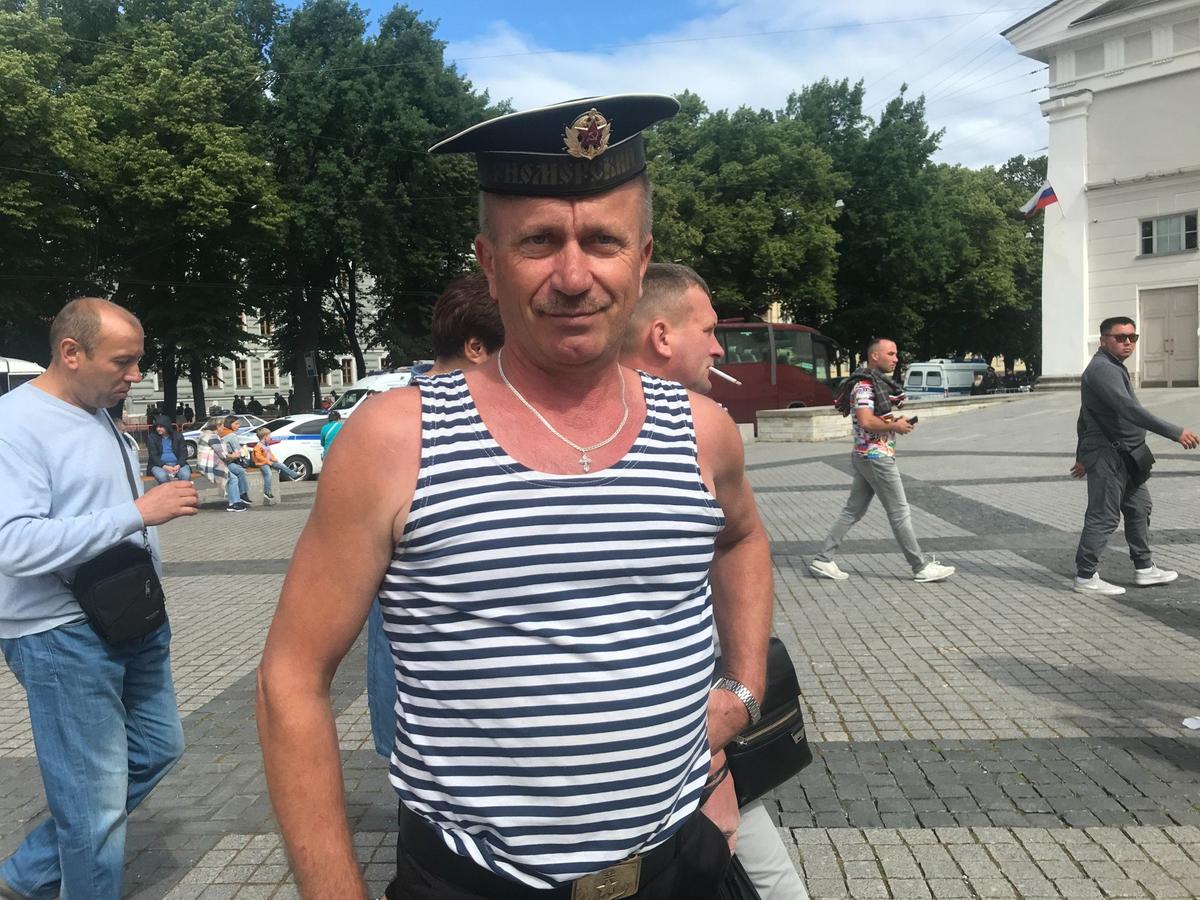
A sailor who wished to remain anonymous. Photo: Irina Tumakova for Novaya Gazeta. Europe
“I served in the Navy, it’s important for me to remember my friends, my ship. Of course, it’s a holiday! Can’t you see? Power and beauty!
What about the Moskva cruiser? You know, I don’t believe it. They didn’t just sink the Moskva cruiser. It’s politics. They are clearing out the Nazis.”
Vitaly, who was also in the audience at the parade, introduces himself to me and says that he served three years in the Navy. His cap says that he served in the Pacific Fleet.
“Kamchatka,” Vitaly specifies. “A landing craft.”
He is now in the reserve forces. He does not want to take pictures. This holiday reminds him of his time in the Navy.
“It’s about honour, the motherland,” Vitaly says. “Our duty to the motherland. Our Navy friendship and unity. This patriotic spirit. Those who served and those who are now serving always come together on this day. It’s our Navy brotherhood. We are proud of it.”
The special military operation does not sour Vitaly’s celebratory mood. On the contrary, it makes him even prouder of his country and its fleet.
“I support my president and the objectives my country is fulfilling,” he says. “What do you mean, which objectives? Those that our country is fulfilling. Our guys are doing us proud. They are getting rid of fascism and Nazism. And it’s there, 100%.”
Fyodor has many badges and medals on his chest, he has pinned them right to his Navy tank top.
“This is for the Arctic, the Arctic passage of 1984,” he pulls at one of the pins. “Zakharov’s crew, a nuclear submarine cruiser.”
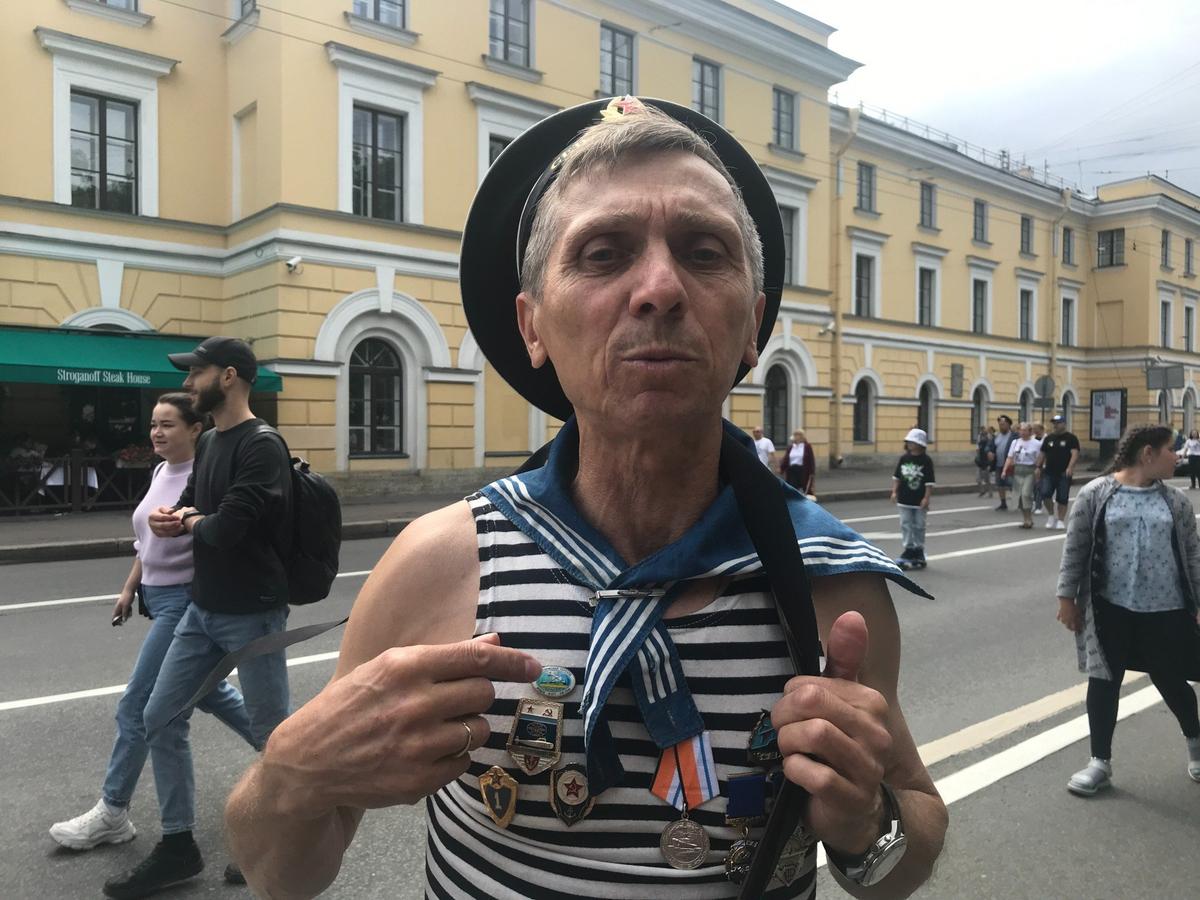
Fyodor. Photo: Irina Tumakova for Novaya Gazeta. Europe"
It is not the first Navy Day parade for Fyodor and his friends. They also came to the embankment in advance to see the ships.
“I live in Leningrad. There are a lot of us here, here are the guys: they came to visit me in person,” he points to a large group of people in Navy tank tops.
“We’ve got our flag. We’ve dressed up and gone out like this every year for 38 years. And now, we are even happier to see each other again. We support it, of course! What losses? Losses among our fleet? That’s some bullshit.”
Fyodor waves us away and hurries off to catch up with his friends.
Dmitry is wearing a military jacket despite the warm weather. He used to serve in the Northern Fleet.
“The fleet is our backbone,” he explains. “There are always losses in the military, that’s our fate. If you’ve chosen a military path, you know that your fate won’t be easy, especially if you’re in the Navy. Navy Day is not just a holiday. It’s a tradition. We are honouring our guys.”
Dmitry says he feels pain when he hears of civilian casualties during the special military operation in Ukraine: he has many relatives there.
“It is very painful to me as a human being,” he nods. “I worry about them a lot.
They don’t understand us now. Not even as relatives. They changed their opinion of us at once and are telling me all sorts of things.”
“What would you do in their place?” I ask.
“I would be a patriot. I am a patriot of my country.”
Darya and Olga are friends. Darya’s father served in the Navy, which is why she and her friend decided to attend the parade.
“I came here because I’m a patriot,” Darya explains. “I also wanted to see the equipment: the planes, the ships.”
“I love military stuff,” Olga says.
“Now I see that we’ve got the power, after all,” Darya continues. “Our equipment is getting better. The Severodvinsk submarine is over there. I was born there.”
Darya corrects herself quickly: there is no “after all”, she has never had any doubts about Russia’s military power.
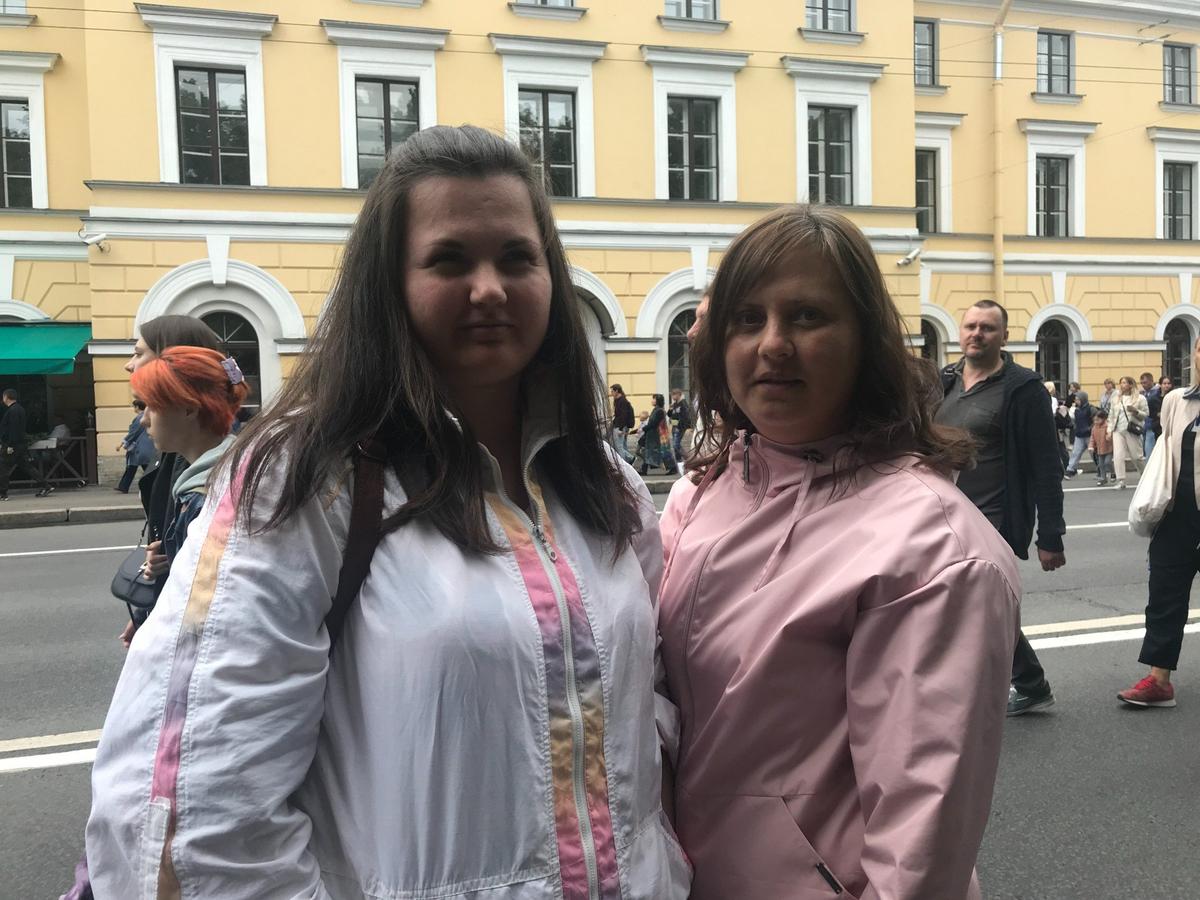
Olga and Darya. Photo: Irina Tumakova for Novaya Gazeta. Europe"
“But sometimes… I don’t know how to say it even,” she thinks it over for a bit, but she quickly finds the right words: “Proud. We are proud of our country.”
“Of what exactly?” I ask.
“Of what exactly?” Darya redirects the question to her friend.
“Of the peaceful sky above our heads!” Olga responds. “Of our army.”
“We’ve got our defence, after all,” Darya nods. “If our enemies attack us, we can respond.”
“What enemies?” I ask.
The girls laugh pointedly.
“We don’t know a lot of things,” Darya says after a while. “The media tells us one thing about what’s happening in Ukraine, and the news from the frontlines tells another story. They say it’s not going great. So, I’m glad that we’re not under attack, shall we say. But we are fighting for what is ours. We are fighting for justice.”
“While they bombed Dombas, the Ukrainians lived a peaceful life,” Olga says, clearly pronouncing Donbas with an “m”. “They demeaned, tortured and imprisoned Russians over there, that kind of thing. There are Nazis there. And when they got a warning, they… If we wanted war, this wouldn’t have gone on for this long, you know. We would have launched a couple of Topols (RT-2PM Topol, a Russian intercontinental ballistic missile — translator’s note) over there and that’s it.”
I ask the women if they know anything about Bucha.
“I don’t know anything,” Olga responds quickly.
“We don’t even know this word,” Darya chimes in.
Although St. Petersburg resident Vera laments the fact that her grandson practically could not see the parade, she says that Russia demonstrates its power and “modern equipment” not just at the parade, but on the field of the “special military operation” as well.
“I am against any war,” she says. “You should always find a peaceful solution. War is the last resort. I didn’t witness the Great Patriotic War (a term used in Russia and a number of post-Soviet states to describe the war on the Eastern Front of WWII from 1941 to 1945 — translator’s note). My grandfather died on the Finnish border. My uncle was captured by the Germans, he died at 21. Another uncle fought on the Kursk salient. And now we’re fighting fascism again.
What is happening now? Take Ukraine, for example. It’s a tough situation there, the Banderites (a term used by Russia to describe the pro-western government in Ukraine. This term alludes to anti-Soviet partisans in WWII — translator’s note) are there, there is no respect towards our Russian people. We tried to reason with them peacefully, but the West doesn’t hear us.”
A large group of friends are setting up a “picnic” on the sidewalk near the Manege Exhibition Hall. A young man in a Navy tank top pulls out elegant-looking melchior shot glasses and pours some cognac. His friend in a regular T-shirt places a cheese platter near the shot glasses. A woman in a sailor cap is lagging a little behind. Her name is Zhanna. They also came out to watch the parade, but they did not see much from the crowd.
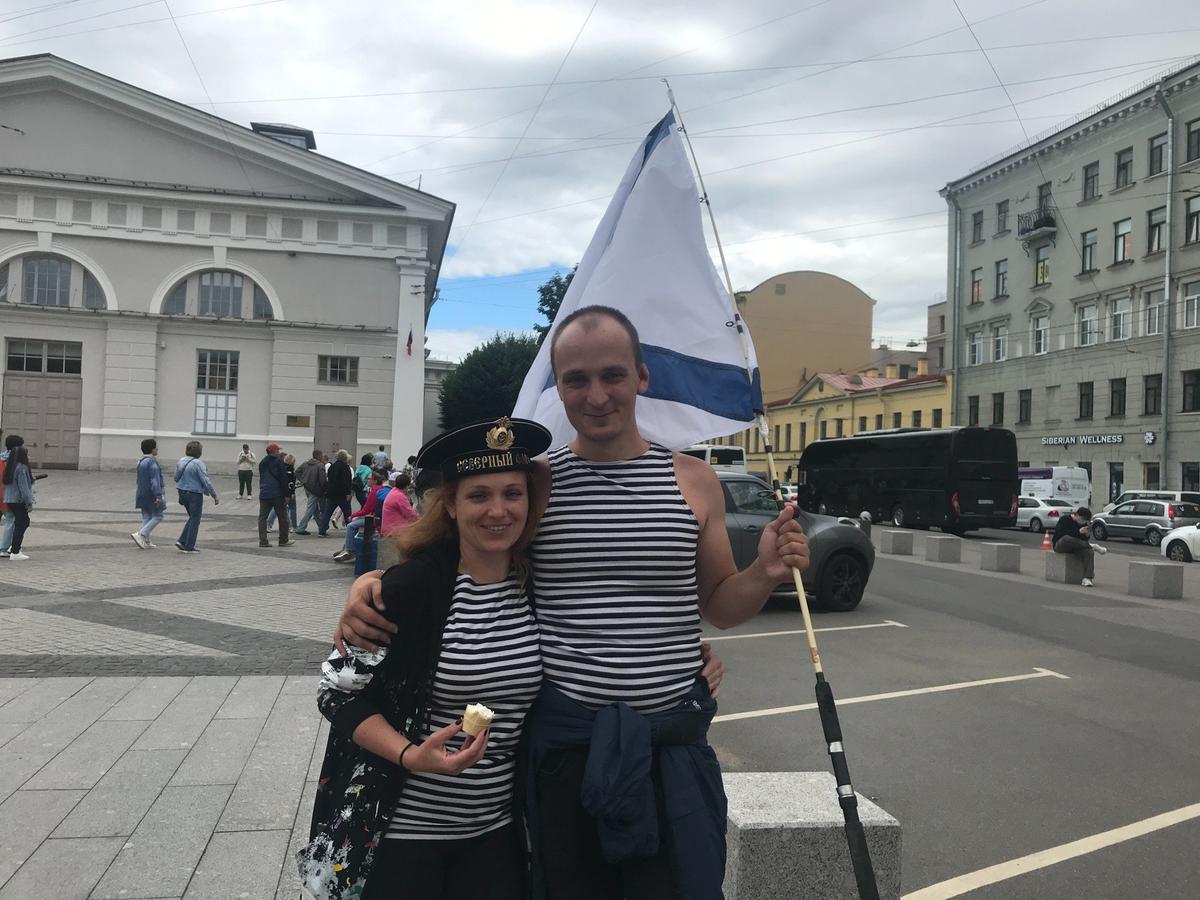
Zhanna and Ivan. Photo: Irina Tumakova for Novaya Gazeta. Europe"
“We only saw the planes,” Zhanna laments. “We arrived at eleven and we couldn’t get anywhere. We felt proud of our country, of our military preparedness. Of our equipment. Have you seen how many people came? Patriotism is on the rise now.”
Russia is “fighting for its rights” in Ukraine now, Zhanna affirms.
“The rights of our country,” she reiterates.
“The rights to what?” I ask.
Zhanna says she does not understand the question. I clarify: what rights of our country are we defending in Ukraine?
“Well, they shelled the DPR and other republics for eight years,” Zhanna starts off slow and hesitant, but then she catches herself. “It’s common knowledge. Are you sure you’re Russian?”
Although Zhanna is dressed like a sailor, she did not serve in the naval forces, but her boyfriend Ivan was in the army. Not in the Navy either, though. She nods towards the guy in the Navy tank top who is pouring cognac. He gets a big smile on his face when he hears what our newspaper is called.
“We know about Dozhd and Navalny, too, we know a lot of forbidden things!” he says wryly.
Zhanna nods at me to signal that I can direct some questions at her friend. But he tells me: no politics today. Or they’ll lock us up for spreading “fake news”.
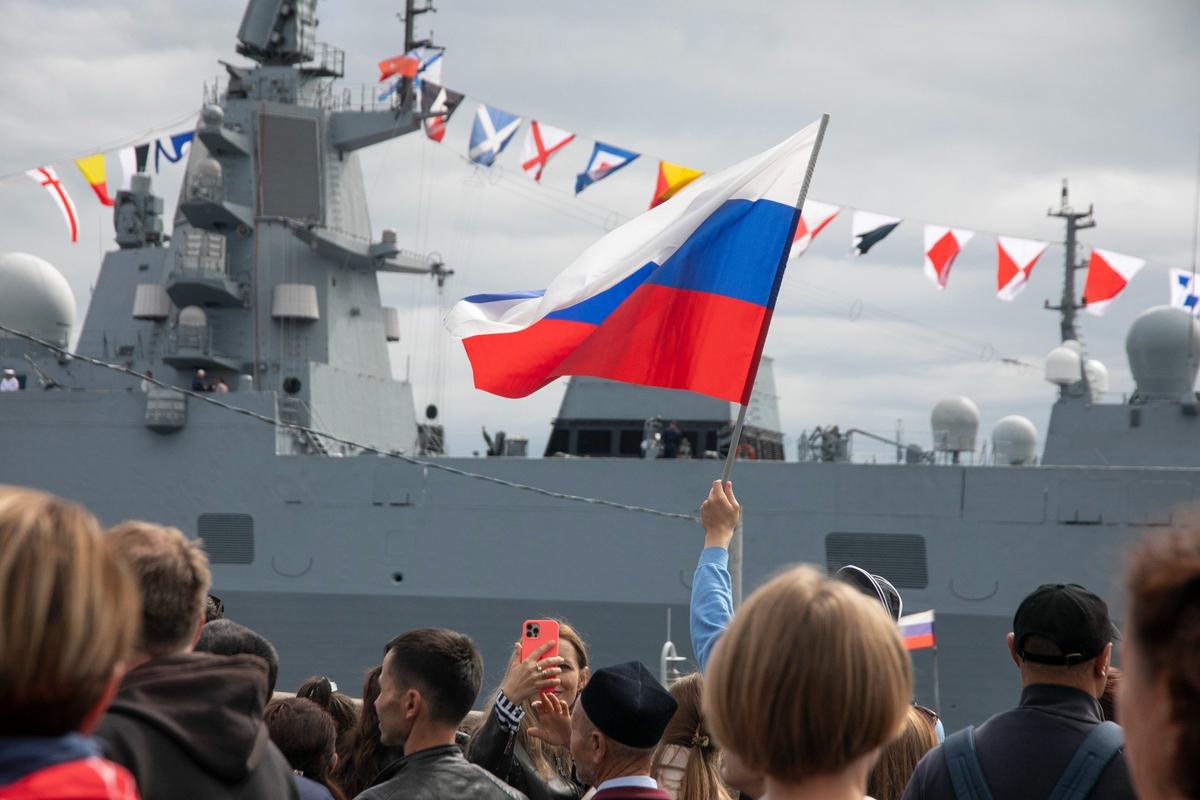
Photo: Igor Selivanov for Novaya Gazeta Europe
Join us in rebuilding Novaya Gazeta Europe
The Russian government has banned independent media. We were forced to leave our country in order to keep doing our job, telling our readers about what is going on Russia, Ukraine and Europe.
We will continue fighting against warfare and dictatorship. We believe that freedom of speech is the most efficient antidote against tyranny. Support us financially to help us fight for peace and freedom.
By clicking the Support button, you agree to the processing of your personal data.
To cancel a regular donation, please write to [email protected]
